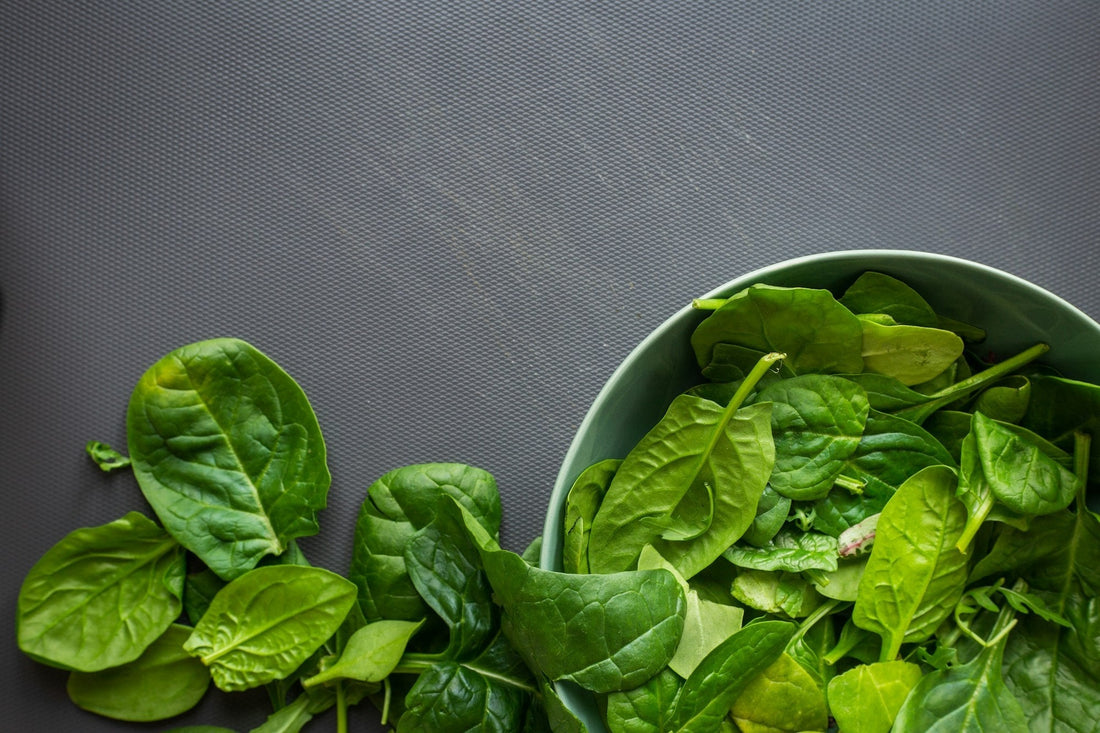Food is one of life's greatest joys. However, living in the modern world has significantly changed the role of food in our lives; rather than being a simple source of nutrition and sustenance, food can now also be consumed for pleasure and enjoyment. Having an abundance and variety of foods available to Australians these days has come with many benefits, however, this convenience comes with its downsides, too.
Specifically, it has been found that Australians have become more and more concerned about managing cholesterol because of the detrimental effects on heart health caused by too much cholesterol (1). Although the body naturally produces cholesterol via lipoproteins made by the liver, cholesterol is a necessary substance for bodily functions. We may disrupt this balance when we over-consume cholesterol-rich foods allowing for the deposit of too much cholesterol in our blood stream that our body has no use for (1).
Heart health hazards are a major concern for many Australians (2). If one discovers that their cholesterol levels need to be better managed, it's imperative that they adjust their lifestyles immediately to address this problem and avoid cardiovascular complications. When it comes to cholesterol-related health issues, doctors and medical researchers are in agreement about what people should do about them. For starters, they would be able to inform them about how to incorporate a low cholesterol diet in their daily health regimen, as well as what kind of exercise is required to reduce cholesterol, that can be initiated and sustainably practiced (2).
This article does a deep dive on the importance of cardiovascular health and its relationship with cholesterol, as well as several factors that influence cardiovascular health, eating healthy, exercising regularly, as well as sharing tips to lower cholesterol that Australians can benefit from, starting today.
All about heart health
The human heart is an organ that pumps blood to other organs and systems in our body, supplying cells and tissues with oxygen and nutrition (1). For a relatively small organ that measures the same size as a clenched adult fist, it plays a vital role in our survival and well-being (2, 3). If our heart is healthy and functioning the way it should, the rest of our body follows suit; in contrast, a heart that's performing inefficiently or is ridden with several issues can cause a host of negative effects that we would suffer from (2, 3).
Living a healthy lifestyle is the best thing you can do to keep your heart in good shape (4). The heart, as strong as it is, is susceptible to a number of diseases if we do not give it the proper care it deserves. When heart health is neglected, you may experience symptoms such as chest pain or tightness, irregular heartbeat, lightheadedness, difficulty breathing, palpitations, fatigue or prolonged periods of tiredness (4). These signs can indicate more serious cardiovascular problems that may require a checkup by your cardiologist.
There is a range of factors that contribute to heart health, many of which are under our control. One of the things we can do to keep our hearts well-cared for is to pay attention to what we eat. As so much of the food we eat on a daily basis is pumped with cholesterol, we fail to realize that our food does our body more harm than good (8). Having high cholesterol levels is one of the biggest hazards to heart and overall health, but fortunately, there are things we can do to lower cholesterol and keep it at healthy levels.
To better appreciate the role of cholesterol in heart health and the tips to lower cholesterol, this article will briefly discuss what cholesterol is, where we get it from, and the role it plays in our bodies.
Understanding cholesterol
You may only know cholesterol as one of the bodily substances measured by a thorough blood test. General understanding of cholesterol is usually limited to the scale of low, normal or high. However, there is a lot more to this bodily substance.
Cholesterol is a waxy substance produced by the liver. And because it naturally occurs in the body, it is not inherently bad. It is a misconception that tips to lower cholesterol exist in order to help us flush out all traces of cholesterol from our bloodstream. In reality, cholesterol, when kept at healthy levels, contributes to processes carried out by the digestive system, keeps cells healthy and strong, plays a role in hormone production and maintenance, and ultimately, helps the heart efficiently transport oxygen-rich blood to the rest of the body. Since the body produces cholesterol on its own, there is actually little need to consume even more cholesterol in our diet (9).
However, consuming cholesterol via common foods we eat on a daily basis is unavoidable. If food options like processed meat, saturated fats, vegetable oils, trans fats, among others are often incorporated in your meals, you may be susceptible to or already have cholesterol levels that are high (9). Foods high in saturated fat also contribute to our cholesterol levels, such as cakes, breads and other sweets, as well as processed foods containing coconut or palm oil like commercial crisps and spreads (10). This brief highlights the need to explore a low cholesterol diet as well as takes us through some important tips to lower cholesterol.
Good vs. bad cholesterol
As a final note on understanding cholesterol and tips to lower cholesterol, it's important to point out that there is good cholesterol as well as bad cholesterol.
In the most basic sense, high-density lipoprotein (HDL) cholesterol is “good” cholesterol because it is deposited in the liver. The liver can effectively make use of this kind of cholesterol to help the body perform several functions as described above, or, flush it out from the body if there is too much of it (8)..
On the other hand, Low-density lipoprotein (LDL) cholesterol is “bad” cholesterol because it is directly delivered to the heart. The heart cannot metabolize cholesterol, hence, too much cholesterol in our bloodstream can lead to the blockage of arteries, raising the risk of potentially life-threatening cardiovascular complications (8).
In the end, a low cholesterol diet or low cholesterol recipes should not only decrease LDL cholesterol but also increase HDL cholesterol for your heart to reap the most benefits from improved eating habits.
Exercise and cholesterol
Switching to a low cholesterol diet or cooking low cholesterol recipes are not the only things you can do to manage cholesterol. Exercise to reduce cholesterol is a must to affect lifestyle changes. Regular exercise, specifically a consistent regimen that consists of 30-minute sessions of moderate exercises five times weekly, or vigorous 20-minute aerobic workouts done thrice weekly, are also ranked highly amongst the tips to lower cholesterol (5).
Additional pointers for managing cholesterol
Advantages reaped from a low cholesterol diet or intake of low cholesterol foods, in addition to regular exercise to reduce cholesterol, are enhanced when secondary lifestyle changes are made. Some of these changes include:
Seeing your cardiologist regularly
Setting regular doctor's appointments can help you monitor your cholesterol levels. Doing a lipid profile blood test measures the cholesterol and fat levels in your body and keeps your heart healthy (10).
Avoiding or quitting smoking (5).
The risk of cardiovascular diseases in smokers increases 1.6 times as compared to non-smokers (6). Smoking damages the blood vessels in your heart7, making them less efficient in ridding unwanted cholesterol from the bloodstream.
Getting good quality sleep
Sleeping well for at least seven hours each night boosts heart's health (5). Sleep deprivation can lead to higher risk of high blood pressure, cardiovascular complications and diabetes (5).
The most powerful takeaway from this article is that tips to lower cholesterol include the duo of a low cholesterol diet or recipes and exercise to reduce cholesterol.
If you are looking to complement your healthy lifestyle with a monthly vitamin subscription, Vitable Australia may just be the right thing for you. Now you can have your very own personalised daily vitamin packs delivered straight to your doorstep. These multivitamin packs can provide the right boost you need to make the most out of your everyday life.
*Always read the label. Follow the directions for use. If symptoms persist, talk to your health professional. Vitamin and/or mineral supplements should not replace a balanced diet.
References:
- Health Direct Content Team. “Heart”. Health Direct: Healthdirect.Gov.Au. Published March 3, 2019 on https://www.healthdirect.gov.au/heart. Accessed December 17, 2021.
- Government of Western Australia Department of Health Content Team. “How Your Heart Works”. Government of Western Australia Department of Health: Healthywa.Wa.Gov.Au. Published April 18, 2018 on https://www.healthywa.wa.gov.au/Articles/F_I/How-your-heart-works. Accessed December 17, 2021.
- Better Health Channel Content Team. “Circulatory system explained”. Better Health Channel: Betterhealth.Vic.Gov.Au. Published on https://www.betterhealth.vic.gov.au/health/conditionsandtreatments/circulatory-system#the-heart. Accessed December 17, 2021.
- Better Health Channel Content Team. “Heart explained”. Better Health Channel: Betterhealth.Vic.Gov.Au. Published August 24, 2020 on https://www.betterhealth.vic.gov.au/health/conditionsandtreatments/heart. Accessed December 17, 2021.
- Mayo Clinic Content Team. “Strategies to prevent heart disease”. Mayo Clinic: Mayoclinic.Org. Published October 26, 2019 on https://www.mayoclinic.org/healthy-lifestyle/adult-health/in-depth/skin-care/art-20048237. Accessed December 17, 2021.
- Lu, Z., Jiang, H. “Healthy heart, happy life”. National Center for Biotechnology Information: Ncbi.Nlm.Nih.Gov. Published September 2014 on https://www.ncbi.nlm.nih.gov/pmc/articles/PMC4248376/. Accessed December 17, 2021.
- The Heart Foundation Content Team. “Keeping your heart healthy”. The Heart Foundation: Heartfoundation.Org.Au. Published May 4, 2020 on https://www.heartfoundation.org.au/heart-health-education/keeping-your-heart-healthy. Accessed December 17, 2021.
- Better Health Channel Content Team. “Cholesterol”. Better Health Channel: Betterhealth.Vic.Gov.Au. Published on https://www.betterhealth.vic.gov.au/health/conditionsandtreatments/cholesterol. Accessed December 17, 2021.
- Health Direct Content Team. “How to lower your cholesterol”. Health Direct: Healthdirect.Gov.Au. Published on https://www.healthdirect.gov.au/how-to-lower-cholesterol. Accessed December 17, 2021.
- Health Direct Content Team. “Cholesterol”. Health Direct: Healthdirect.Gov.Au. Published April 15, 2020 on https://www.healthdirect.gov.au/what-is-cholesterol. Accessed December 17, 2021.
- Choi, H. D., Youn, Y. K., & Shin, W. G. “Positive Effects of Astaxanthin on Lipid Profiles and Oxidative Stress in Overweight Subjects”. National Center for Biotechnology Information: Ncbi.Nlm.Nih.Gov. Published October 1, 2011 on https://pubmed.ncbi.nlm.nih.gov/21964877/. Accessed December 17, 2021.
- Health Direct Content Team. “Magnesium and your health”. Health Direct: Healthdirect.Gov.Au. Published April 15, 2020 on https://www.healthdirect.gov.au/what-is-cholesterol. Accessed December 17, 2021.
- Olatunji, L.A., Soladoye, A.O. “Effect of increased magnesium intake on plasma cholesterol, triglyceride and oxidative stress in alloxan-diabetic rats”. National Center for Biotechnology Information: Ncbi.Nlm.Nih.Gov. Published June 2007 on https://pubmed.ncbi.nlm.nih.gov/19205579/. Accessed December 17, 2021.
- National Institutes of Health: Office of Dietary Supplements Content Team. “Carnitine”. National Institutes of Health Office of Dietary Supplements: Ods.Od.Nih.Gov. Published March 29 2021 on https://ods.od.nih.gov/factsheets/Carnitine-HealthProfessional/. Accessed December 17, 2021.
- Malaguarnera, M., Vacante, M., Avitabile, T., Malaguarnera, M., Cammalleri, L., & Motta, M. “l-Carnitine supplementation reduces oxidized LDL cholesterol in patients with diabetes”. National Center for Biotechnology Information: Ncbi.Nlm.Nih.Gov. Published December 3, 2008 on https://academic.oup.com/ajcn/article/89/1/71/4598288. Accessed December 17, 2021.
- Mayo Clinic Content Team. “Fish oil”. Mayo Clinic: Mayoclinic.Org. Published December 8, 2020 on https://www.mayoclinic.org/drugs-supplements-fish-oil/art-20364810. Accessed December 17, 2021.
- Shen, T., Xing, G., Zhu, J., Zhang, S., Cai, Y., Li, D., Xu, G., Xing, E., Rao, J., & Shi, R. (2017). “Effects of 12-week supplementation of marine Omega-3 PUFA-based formulation Omega3Q10 in older adults with prehypertension and/or elevated blood cholesterol”. National Center for Biotechnology Information: Ncbi.Nlm.Nih.Gov. Published December 27, 2017 on https://www.ncbi.nlm.nih.gov/pmc/articles/PMC5745982/. Accessed December 17, 2021.
- Physicians Committee for Responsible Medicine Content Team. “Omega-3 Fatty Acids and Plant-Based Diets”. Physicians Committee for Reponsible Medicine: Pcrm.Org. Published September 4, 2020 on https://www.pcrm.org/good-nutrition/nutrition-information/omega-3. Accessed December 17, 2021







